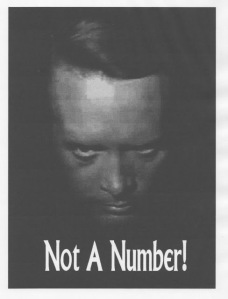Picture the scene… the year was 1983. A wilful teenager, brimming with the bluster of youth, sits down in front of the family television. The neonate member of the UK’s televisual family, Channel 4, is already on screen. The teenager impatiently clockwatches as each second ticks down to the awaited hour of 10pm. She was awaiting the repeat of an episode of a 1960s television series that, only weeks before, she had ridiculed for its ‘silly closing credits’. Her youthful arrogance, however, subsided upon watching the latest episode; it was, without doubt, a turning point in her life. Duran Duran, her erstwhile passion, faded into the background; posters of the new television series, with its powerful leading actor, replaced the bouffant boyband images that had previously pouted down from the bedroom walls. The message of the Series was not lost on the teenager; she thirsted for greater knowledge and began her journey of self-education, of true learning…
… 30 years later, the wilful teenager is now a middle-aged mother of teenage daughters, the youngest of whom is the very age she was when she first watched Patrick McGoohan’s televisual opus, ‘The Prisoner‘. And every single day, the middle-aged mother expresses a silent, respectful gratitude to the Man who was responsible for her awakening.
‘The Prisoner‘ is, without doubt, the seminal televisual masterpiece of not only the decade of its genesis, but the entire history of television. This 17 Part Serial, originally screened in 1966/1967, depicted the plight of a former secret agent; a man who is gassed, abducted and taken to a nameless village where various nefarious methods are employed to persuade him to reveal the reasons for his resignation. The idyllic Village, with its Italian architecture, paints a pretty picture – but beneath the serene facade lies a sinister operation. There was no continuity of leadership, with the puppet leader (No.2) changing on almost a weekly basis. No cash currency existed in The Village – “credit units” in the form of a credit card or slips of paper were, however, available. There was no diversity of nationality – differentiation was an unspoken taboo. People became nameless upon their entry into The Village, referenced by their numbers alone. CCTV cameras not only monitored the external activities of The Village’s residents – cameras surreptitiously monitored each villager as they followed their daily routines within the false security of their own homes. Freedom of thought and individuality were considered criminal acts and errant individuals who disobeyed these laws were drugged and punished accordingly.
Patrick McGoohan, who passed away on 13 January 2009, was an underrated visionary of our times. The fears so disturbingly presented on his Opus – a future of a monitored and brainwashed mankind – appear to have come to pass. The Emmy-award winning actor expanded his viewpoints further in an excellent 1977 interview with the late Canadian television interviewer, Warner Troyer (detailed below). Even though 10 years had elapsed since the screening of ‘The Prisoner’ at the time of the interview, McGoohan’s foresight of the future of mankind remained uncannily accurate. He voiced his fears that mankind was being run by an unholy conglomerate consisting of, amongst others, the Military Industrial Complex and Madison Avenue. He foresaw a desperate outcome if mankind did not, in effect, stop the rot.
And to this day, one wonders how exasperated Patrick McGoohan must have felt as he watched those fears materialise into stark reality… yet, as the following interview with Warner Troyer reveals, he never lost sight of solutions to the problem in hand…
Willow.





